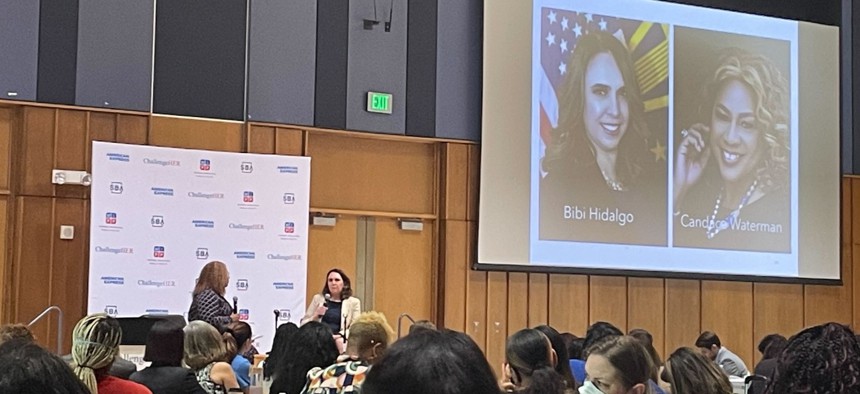
Bibi Hidalgo, associate administrator in SBA’s Office of Government Contracting, said contract bundling is an issue that concerns her. Courtney Buble / GovExec
‘Contract Bundling’ is an Issue That’s Still Top of Mind for the Small Business Administration
This issue impacts women-owned small businesses disproportionately, said an SBA official.
When asked what keeps her up at night, a top Small Business Administration official said “contract bundling,” which is when agencies bundle several different contracts together and award the work to one company in an attempt to save taxpayer dollars.
Candace Waterman, president and CEO of Women Impacting Public Policy, asked Bibi Hidalgo, associate administrator in SBA’s Office of Government Contracting, the question during an event on Thursday in Silver Spring, Maryland for “ChallengeHer,” an initiative started in 2013 by the SBA, Women Impacting Public Policy and American Express to boost federal contracting opportunities for women-owned small businesses.
Contract bundling––just one issue small businesses, particularly women-owned ones, face when trying to enter the federal marketplace––“in theory may be saving dollars, but what happens then is those contracts are no longer available for smaller businesses because a small business wouldn’t really be able to compete necessarily for a $7 billion contract,” Hidalgo told Government Executive in an interview. “But they can compete for a $20 million, a $50 million or $100 million [contract].” This is something administrations have wrestled with for years, as Government Executive has previously reported.
Last month, SBA announced that the Biden administration exceeded its governmentwide small business contracting goal for fiscal year 2021 by awarding a record-breaking $154 billion in federal contract dollars to small businesses–an $8 billion increase from the previous fiscal year. While there were other significant achievements, officials said the small business industrial base has declined about 10% over the last decade. Also, the percentage of contracting dollars that went to women-owned small businesses came in at 4.63%, slightly under the goal of 5% and down from 4.85% the previous year.
Hidalgo said contract bundling could have “absolutely” had an effect on the results for women owned small businesses in the most recent scorecard. A professor from the University of Washington Seattle who is on detail in her office did a study “and it showed that every time they bundle it’s disproportionately women-owned businesses that are impacted, so if we’re going to meet that 5% goal, then we need to make sure that the contracts are being set aside for [women-owned small business] firms.”
In her prepared remarks for a House hearing earlier this summer, Hidalgo said the government bundled a total of $44 billion in contract work performed by small businesses in the decade prior to fiscal 2019, but since then that has been consolidated into large-business contracts. In the past three fiscal years, “the federal government has bundled a total of $112 billion—averaging almost a full decade’s worth of bundling each year.”
There are some instances when there can be a negotiation for a small business to get some of the bundle contract, but behind the scenes major corporations often don’t want that to happen, Hidalgo told Government Executive.
SBA has a limited number of procurement center representatives “that monitor these contracts,” Hidalgo said at the event. “Not only that, but the agencies only have to give us 30 days notice before they bundle the contract, so that only gives us 30 days to negotiate and we have in my office the authority to take it all the way to secretary, but we’re realizing there isn’t enforcement at the secretarial level and so those are the conversations we’re having—Administrator [Isabella] Guzman—now with the agencies.”
Hidalgo also noted in her recent testimony before Congress that members of both parties were interested in resolving the issue of contract bundling. She told them “we need to be able to work with you, so that there’s more accountability on the front end instead of the back end where we only have 30 days to negotiate.”
Hidalgo lauded the Biden administration's initiatives since coming into office to help small businesses, including its attempts to double the share of federal contracts that go to small, disadvantaged businesses over the next few years and to reform the practice of “category management” to give more contracting opportunities to underserved businesses. She added that the White House and its councils, the Office of Management and Budget, SBA and all the major contracting agencies are now working on addressing the issues small businesses are facing and navigating the pull between efficiency and supporting those organizations.
Additionally, SBA announced earlier this summer that it has increased the number of certified firms to contract with the government from about 1,000 to nearly 6,000, and “now over 92% of federal spending is covered by [North American Industry Classification System] codes eligible for [women owned small business] set-aside awards.”
Waterman pointed out the ripple effect of awarding contracts to small businesses as it helps them build their capacity and can enable them to subcontract with other small businesses, calling it “the pebble in the pond effect in our community.”
NEXT STORY: Just 1 Hour of Lost Sleep Saps Our Generosity







